How Does the 'Lessons in Chemistry' Series Compare to the Book?
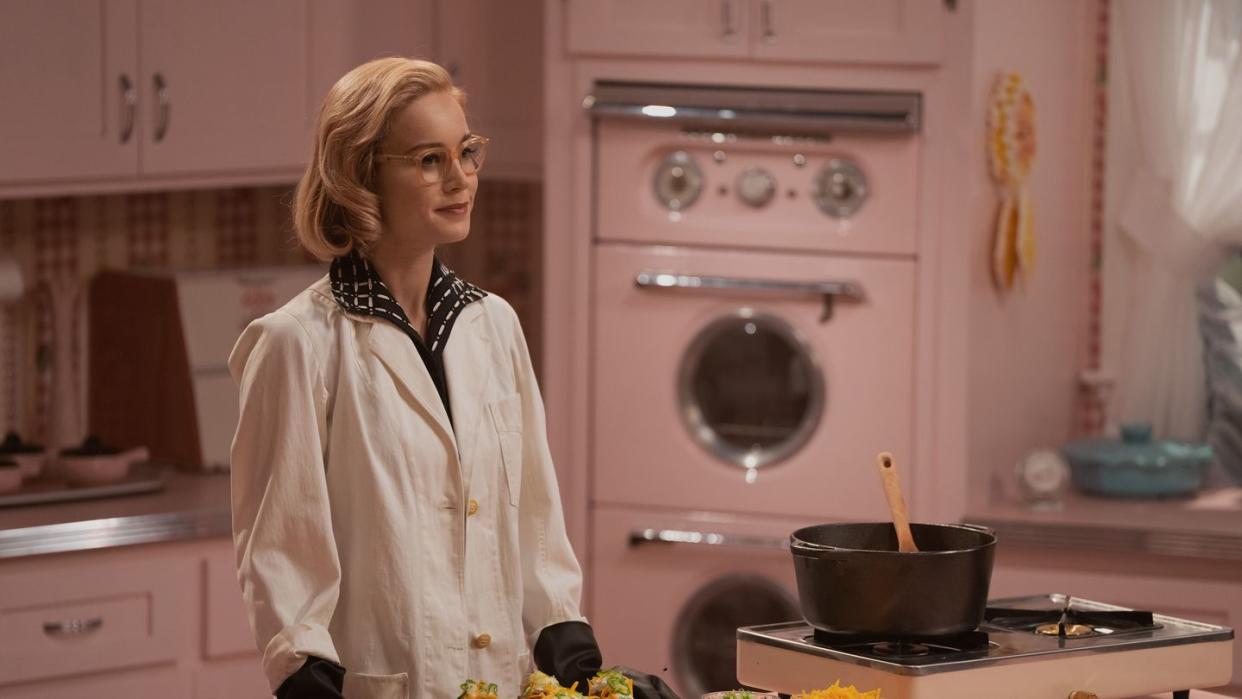
"Hearst Magazines and Yahoo may earn commission or revenue on some items through these links."
Spoilers below.
I know by now not to judge a book by its cover, but diving into Lessons in Chemistry still surprised me after flipping past its bubblegum pink cover and playful design. Set in the 1950s, Bonnie Garmus’ wildly popular debut novel follows protagonist Elizabeth Zott, a lab tech at the prestigious Hastings Research Institute. Her lack of a Ph.D. means she cannot get the respect she deserves—her all-male team treats her like a glorified maid—and rampant sexism is far from the only challenge. Amid a sequence of traumatic events, Elizabeth’s dark tale is also one of resilience, love, community, and career. Can the limited series adaptation of the book capture the richness of the source material?
The short answer is yes, and then some. As with any book-to-screen journey, there are notable differences that take a TV audience into account. Lee Eisenberg’s Apple TV+ series, starring and produced by Brie Larson, follows the recipe but isn’t afraid to make some substitutions for a more substantial final dish. That’s particularly true of some supporting characters and the finer details of Elizabeth’s journey from lab tech to reluctant host of TV cooking sensation Supper at Six. However, there are some bumps in the road, and a particularly unusual perspective could be divisive—or at least distracting.
Just as the Lessons in Chemistry book cover is deceptive in its eye-catching flirty illustration, Elizabeth’s television series is a trojan horse. Supper at Six presents itself as a cooking show for housewives to brush up on their skills in the kitchen, but it also offers tools of empowerment that cannot be found in a recipe book. Still, ambition and romance can co-exist, and neither takes a backseat, in the Apple TV+ period drama as brilliant scientist Dr. Calvin Evans (Lewis Pullman) is the fiery catalyst that ultimately puts Elizabeth on a path to TV stardom out of financial necessity. Below, we break down some of the biggest differences between Bonnie Garmus’ bestselling novel and the series. Check back weekly for updates as new episodes drop.
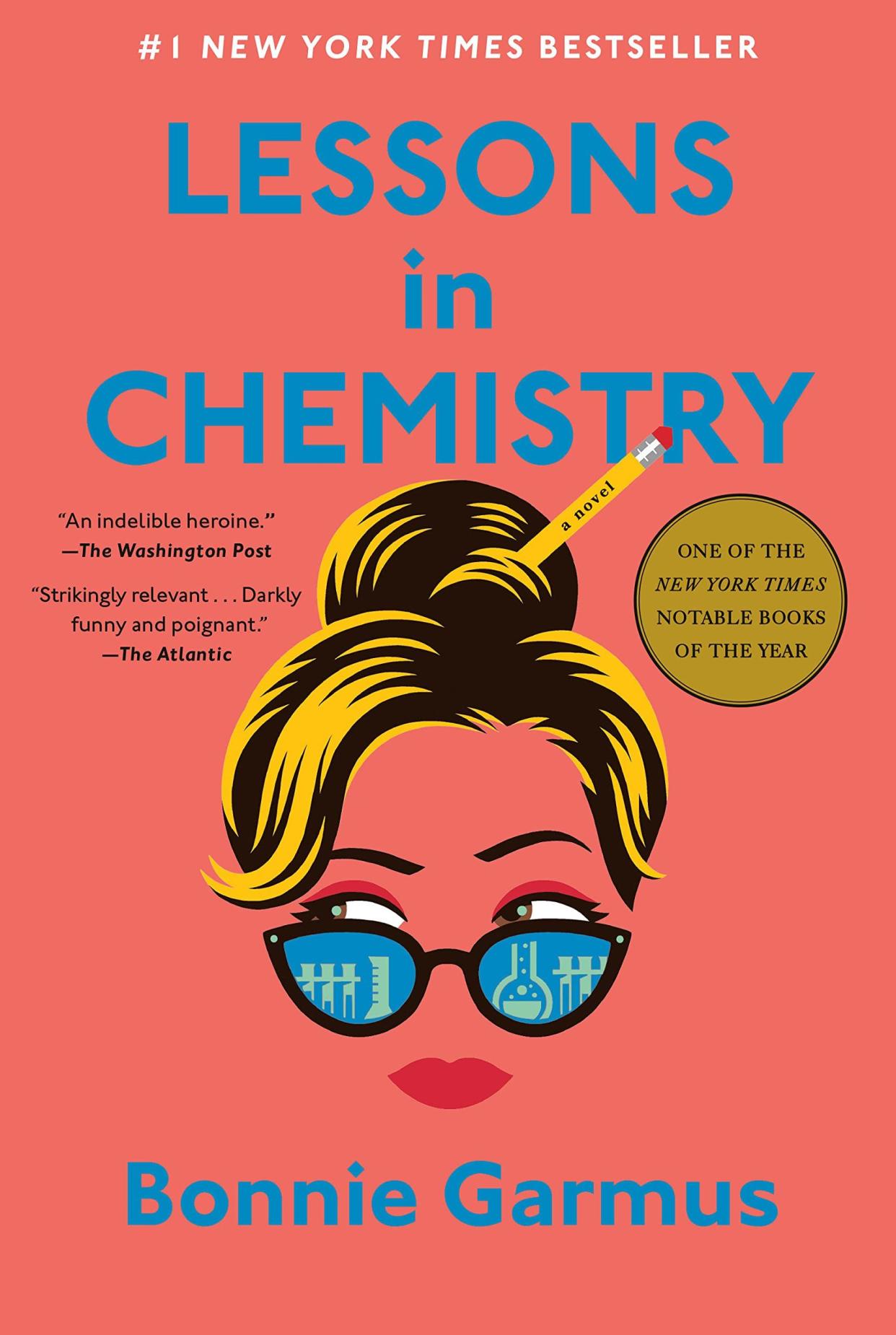
Lessons in Chemistry: A Novel
amazon.com
$15.37
The Love Story
Elizabeth and Calvin’s courtship starts on a fiery note.
Enemies-to-lovers is a tried and tested formula, which both Garmus and Eisenberg understand. In the novel, Elizabeth takes beakers from Calvin’s personal lab and immediately engages in a war of words with him. The show adds subterfuge to this incident as she sneakily takes a bottle of ribose for her after-hours research. Unfortunately, Elizabeth doesn’t realize ultimate busybody Fran Frask (Stephanie Koenig) spots and is not afraid to tattle. Book readers will know Calvin assumes Elizabeth is a secretary, as the notion of a female chemist is unheard of to every man who works in this building, which unsurprisingly does not go down well.
To up the stakes, Elizabeth is practically forced to participate in a cringe-inducing Little Miss Hasting pageant under the guise of being a good team player. This work social replaces a performance of the Mikado from the book as the venue for the great vomit incident. In doing so, it highlights how both are loners within the Hastings employees. Like the novel, Calvin’s sickness is triggered by perfume, and a humiliated Elizabeth exits the competition early. When he inadvertently pukes all over Elizabeth’s back, it allows the mortified Calvin to reintroduce himself and apologize for his previous error.
The first kiss location is changed.
At first, their relationship remains professional, and the series expands on how Elizabeth’s past trauma makes it hard for her to feel safe—particularly in a room with a shut door. Trust comes from open communication, and an offer to teach Elizabeth how to row becomes part of this process. Whereas in the book, they are already a couple when Calvin takes her out on the water, in the show, it is where they first kiss (instead of the Hastings parking lot). Both versions have Elizabeth initiating the smooch, and Larson and Pulman’s chemistry is off the charts.
In this era, it is taboo for an unmarried couple to move in together, and Calvin’s public proposal in the cafeteria is skipped for something more intimate. Removing the Greek chorus heightens the swoon-worthy festive sequence when Calvin prepares a private feast with Elizabeth and suggests cohabiting. True to the book, the house is paid for (thanks to Calvin’s successful career), so her incredible cooking will suffice. Elizabeth takes food incredibly seriously: It is an act of love and a method of working through setbacks in her life—which will happen sooner rather than later.
Calvin’s fateful run is slightly different.
The second episode, “Her and Him,” is a cold slap in the face. Yep, Calvin just got hit by a bus, and this isn’t a Regina George in Mean Girls situation. Book fans will no doubt have been on edge as soon as Calvin grabbed the dog’s new leash before heading for a run, and what follows is similar—but not the same—to his demise in the novel.
Calvin is an exercise outlier, as jogging or running didn’t become popular until the ’70s. In the novel, Calvin used to run with their pet dog, Six-Thirty, without a leash, and Elizabeth purchased one due to new leash laws. Eisenberg does away with this legal aspect, and here the leash is used so the canine can be Calvin’s new running buddy.
Unfortunately, a game of tug of war occurs while Calvin stands on the road, and he falls back with the leash at the exact wrong moment. If anyone was looking for foreshadowing, the alarm bells should start ringing when Calvin starts talking about the unpredictability of life. In the book, Calvin is run over by a police car after he has slipped on oil and hit his head. He falls after the engine has backfired, causing Six-Thrity to bolt while leashed. Whereas this involves an almost-comedic Rube Goldberg machine level of events, there is horrifying simplicity to the bus coming out of nowhere.
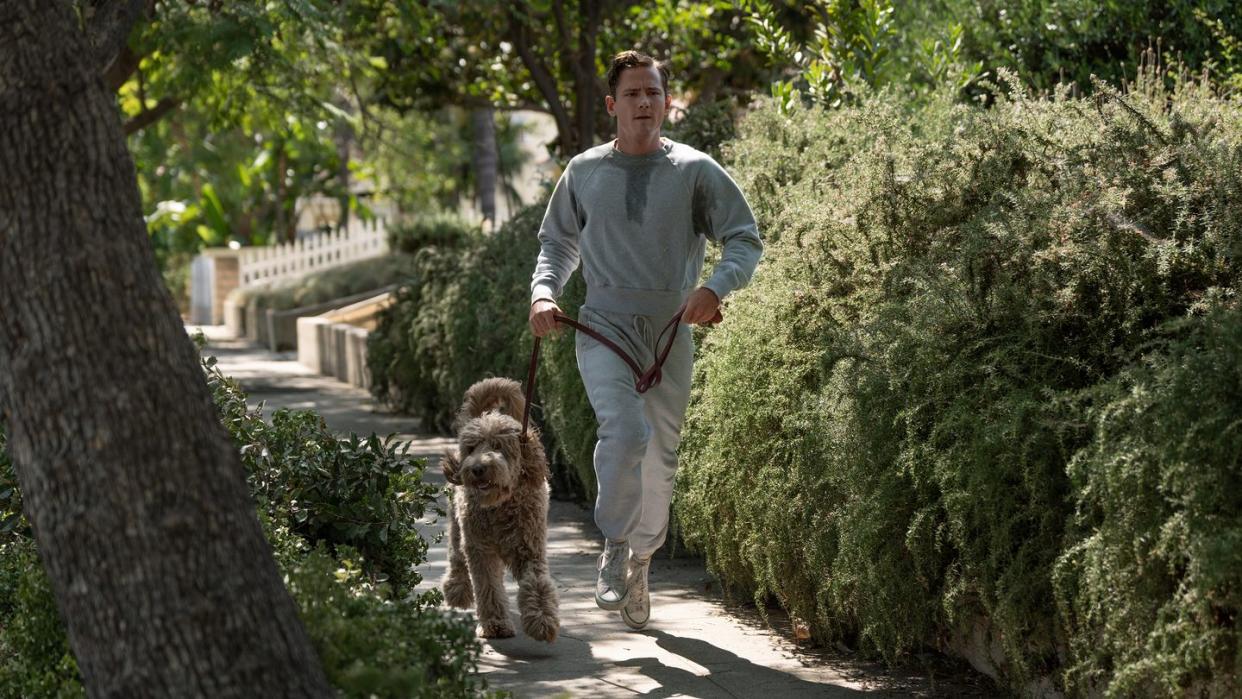
Elizabeth’s unusual pregnancy test is historically accurate.
An unplanned pregnancy changes Elizabeth’s trajectory, and she is unprepared for this big life event without a supportive partner. The frog test she uses to determine whether she is pregnant is based on actual methods used before at-home tests became available in U.S. drugstores in 1977, but is not in the novel. Another discovery in episode 3, “Living Dead Things,” is an engagement ring in a lab coat that still smells like Calvin. It is a crushing moment at home rather than in the lab (as in the book), hammering how much she misses him—even if marriage and children are the last things she wants.
Elizabeth’s baby is called the same name, but the labor is different.
In the novel, Elizabeth does not require anesthesia during her labor, but the series opens up a conversation about medical costs and consent. Elizabeth’s nurse thinks she is being helpful by securing her some pain meds on the house, but the patient has little choice, and she is furious in the aftermath. “If you’re really stuck just go with what you feel right now,” the same nurse suggests about baby name inspiration. “Mad” is Elizabeth’s response, which is how Madeline Zott gets her name. In the book, her internal fury at Calvin and his absence are far easier to convey on the page.
Madeline and the audience are in the dark about Calvin’s childhood.
A family tree assignment that began in the previous episode has ignited Madeline’s curiosity about her father, which matches the book's trajectory even if not all the pieces are identical. While the novel reveals much of what happened to Calvin in an early chapter, the series hasn’t filled the gaps yet. With Elizabeth at work, Madeline has different after-school arrangements, including attending her babysitter’s choir practice. Here, she shows Reverend Wakely (Patrick Walker) a demerit she found in her father’s things, and he recognizes the winged bull illustration to mean he went to a school called St. Luke’s (it is All Saints in the novel) that begins the hunt for where Calvin came from. Wakely’s role is similar in how he assists Mad on her quest.
Calvin’s backstory gets a prohibition makeover.
A flashback to 1930 in the penultimate episode, “The Book of Calvin,” reveals how Calvin’s scientific genius was taken advantage of as a child. A bishop exploits Calvin’s talents during prohibition, using prayer candles as a cover story for an illicit hooch business. When a man called Wilson (Beau Bridges) visits the home, Calvin thinks this is his father. The bishop confirms this and cruelly tells Calvin that “he doesn’t want you.”
Wakely never stopped writing to Calvin.
Madeline’s sleuthing with Reverend Wakely has cracked the school's location and delivers a bombshell that Wakelyknew Calvin. He was not deliberately hiding this; his correspondence with Calvin has similar origins to the book but with some alterations. Wakely attended a lecture Calvin gave and began writing to him, and the pair shared thoughts and debated faith and science. In the novel, Wakely doesn’t respond to a letter in which Calvin reveals the truth about his childhood, saying that he hopes his father is dead. This exchange doesn’t occur in the show, and Calvin writes to Wakely until the day he dies.
The Characters
Harriet Sloane gets a major overhaul.
Of all the changes from the source material, the most notable is to Calvin’s neighbor, Harriet Sloane (Aja Naomi King), who in the book is a middle-aged Catholic white woman with an abusive husband. Rather than simply flip a white character for a Black one, the TV series has rewritten everything about Harriet beyond her name and neighbor status. Harriet has two young children and is similar in age to Elizabeth. Her husband currently serves as a military surgeon in the Korean War, and Calvin is on hand to babysit when needed. Dating this friendship to pre-Elizabeth further fleshes out Calvin and Harriet’s bond.
Harriet’s family, relationships, and age are far from the only alterations. She is an ambitious woman who actively tries to save her community using her legal aid expertise. Plans to expand the freeway threaten this neighborhood, and this storyline is based on historical racist infrastructure practices in states like California. This drastic page-to-screen shift before Harriet and Elizabeth meet is impactful because it shows this character isn’t simply there to serve her neighbor—though this friendship is integral to the series.
In fact, Calvin lets Harriet down in the second episode when he forgets to attend an important meeting about the freeway plans. Harriet knows he holds power as a white man, and his fame as an accomplished scientist is worth its weight in gold to their cause. Instead, Calvin is preoccupied with his burgeoning relationship and work with Elizabeth. Adding this element underscores the myriad ways Black communities are targeted during this time and that, as an ally, words only mean so much when a person doesn’t follow through.
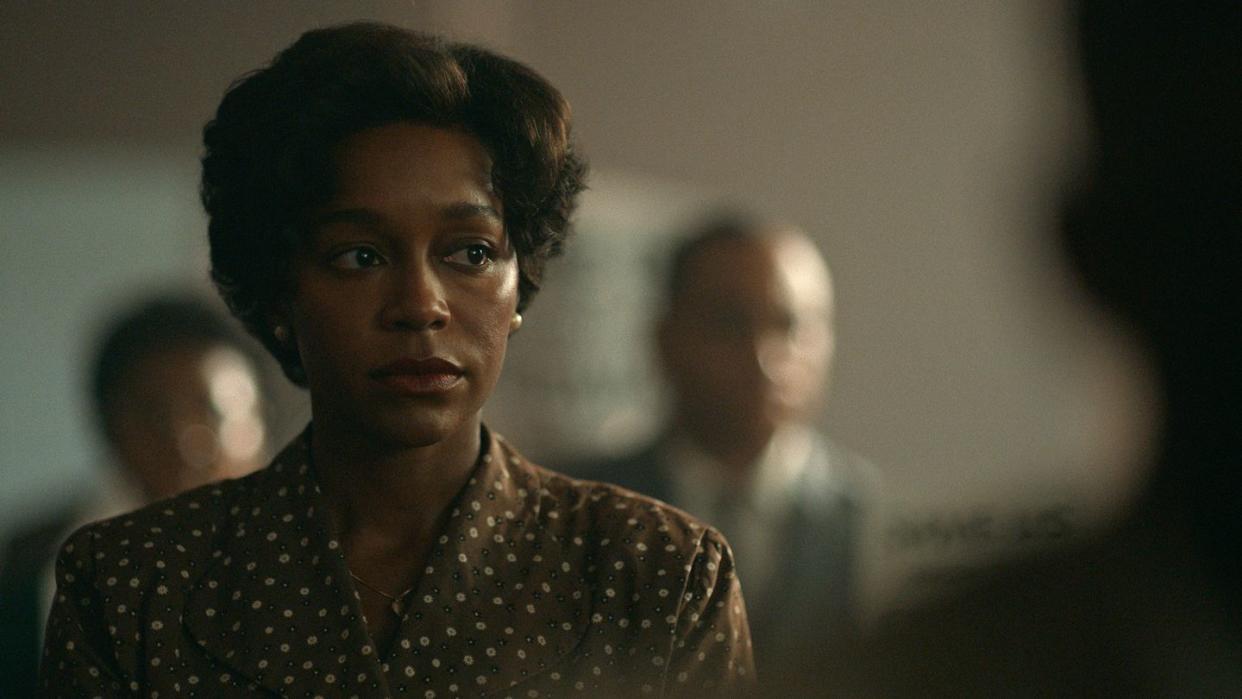
The Hastings co-workers are still awful.
Whereas this Harriet storyline is a show invention, Calvin’s attempts to help Elizabeth bypass sexism at work match the text. She faces misogyny from all sides, and Fran Frask’s know-it-all demeanor closely follows the book. Fran can’t wait to put Elizabeth in her place, which is an ugly side of the supposedly forward-thinking scientific institution. Fran’s fury about Elizabeth skipping out on the pageant further hammers home her antagonistic role early on. The men at Hastings, like Dr. Donatti (Derek Cecil), think Calvin is arrogant and has little time for Elizabeth (even though they often turn to her for work advice). This hostile environment matches the novel’s description.
Six-Thirty, as a narrator, comes directly from the book.
Six-Thirty (played by Goldendoodle Gus) is an integral part of this family, and it is impossible not to fall in love with the fluffy pooch, even if he doesn’t fit the tall, gray, thin, wiry haired description from the novel. In the book, the dog gets his name from Calvin asking what he’s called, and Elizabeth answers with the time, but here, it symbolizes when he wakes Elizabeth up. Exploring Six-Thirty’s backstory is not as simple as in the novel, and Eisenberg’s choice to depict the dog’s perspective might be divisive as it is distracting. Giving the pet a voice (in this case, B.J. Novak’s) nods to the novel, as Six-Thirty’s point-of-view is part of the narrative. Yes, we do find out that he was a canine bomb sniffer who ran away from training, and it explains why he is resistant to the leash. The voiceover also shows how much guilt he has about the accident.
Calvin reaches out to Harriet beyond the grave.
After Elizabeth discovers a Thelonious Monk record in Calvin’s things with an apology note to Harriet reading, “I’ll be there next time,” she reaches out to her neighbor. Anger fueled Harriet’s final conversation with Calvin; now, she is mad that he is no longer here. Calvin does have an impact in a roundabout way when Harriet confronts a journalist for his unflattering piece on the dead chemist. The reporter won’t print a retraction, but he goes to the next freeway planning meeting, giving her cause extra attention. “I know I felt him there in that room with me,” she tells Elizabeth. While the newspaper report on Calvin is accurate to the novel, the rest is an invention of the series, and the story benefits from this addition.
Harriet and Elizabeth’s friendship is equally strong, but Harriet also has career ambitions.
The struggles Elizabeth faces in the novel after giving birth are matched here, and in the book, this is when Harriet introduces herself. However, by this point in the show, rather than wait for the kindness of neighbors, Elizabeth is comfortable enough heading across the street to Harriet’s house when she begins thinking terrible thoughts. King and Larson have an excellent rapport, and Harriet is far too busy with work and her family to be a childcare option, as she is in the book. Harriet says she can finish her law degree after the Korean War ends as her husband is coming home. It is her turn to focus on her career, but Charlie (Paul James) is offered a chief resident job at a local hospital. However, he is confident they can make both career aspirations work.
The Civil Rights movement takes a front seat.
The freeway planning continues, putting Civil Rights to the forefront. The Sloane family watches coverage of the sit-in protests on the news, including Martin Luther King Jr.’s arrest in Alabama. Later, when Elizabeth says she can’t go to the freeway protest because of work, Harriet comments on having deja vu: Calvin didn’t follow through, and it appears Elizabeth won’t either. “You have a platform. What you say matters, and what you don’t say matters as much,” Harriet says. Elizabeth does come through, announcing the freeway sit-in and attending alongside members of the predominantly Black neighborhood. Because Elizabeth is white, she is not beaten or arrested as other Black members of the protest are.
Fran Frask comes back into Elizabeth’s life via a different job.
Fran’s cruelty at Hastings is hard to forget, but things are warmer when Elizabeth bumps into her old coworker in the grocery store. Fran profusely apologizes for how she treated Elizabeth and mentions she has left Hastings. Elizabeth accepts this sincere regret and offers her a ticket to a show taping, which leads to a significant deviation when Fran comes to work as Elizabeth’s chief of staff—thanks to some helpful notes. In the novel, the duo realizes they are alike when Fran reveals an academic advisor also assaulted her. Fran works as Wakely’s typist and has a letter published in Life magazine after Elizabeth is subject to a hit job, but the series finds an organic way to bring her back into the narrative.
The bishop is a coward in both versions.
The villainous behavior of the bishop continues in the present when he lies about Calvin attending this school. An invention of the Apple TV+ series is that when Madeline and Elizabeth visit the home, Madeline refuses to believe the lie. She wants to look through every book in the library for evidence of her dad. Thankfully, Calvin’s love ofGreat Expectations (something the series has already established) proves valuable as they find a copy of the Charles Dickens novel bearing Calvin’s name. It won’t bring him back but provides one major piece of the puzzle and a clue to another as the Remsen Foundation donated the book.
Elizabeth’s Career
Elizabeth’s tragic Ph.D backstory is the same.
Elizabeth’s lack of a Ph.D. is a constant criticism, and in the first episode, she doesn’t get into specifics regarding her unfinished academic record. Again, this is similar to the book, as is what really happened to her, and the series changes what point on Elizabeth’s academic timeline it happens—though in both cases it derails her progress. The second episode opens with a trigger warning, revealing why she hasn’t got her Ph.D. as a tenured professor raped her. Elizabeth used the pencil in her hair to fend off her attacker, stabbing him and getting reprimanded for her actions. In the novel, a UCLA campus cop doesn’t buy her story, and in the series, she is told she can only complete her candidacy if she submits a “formal statement of regret.” She rightly cannot abide saying sorry to the man who raped her, and as far as academia is concerned, she only has her Masters degree. In both the book and show, Elizabeth regrets “not having more pencils,” and this scene speaks to the horrifying obstacles in her career.
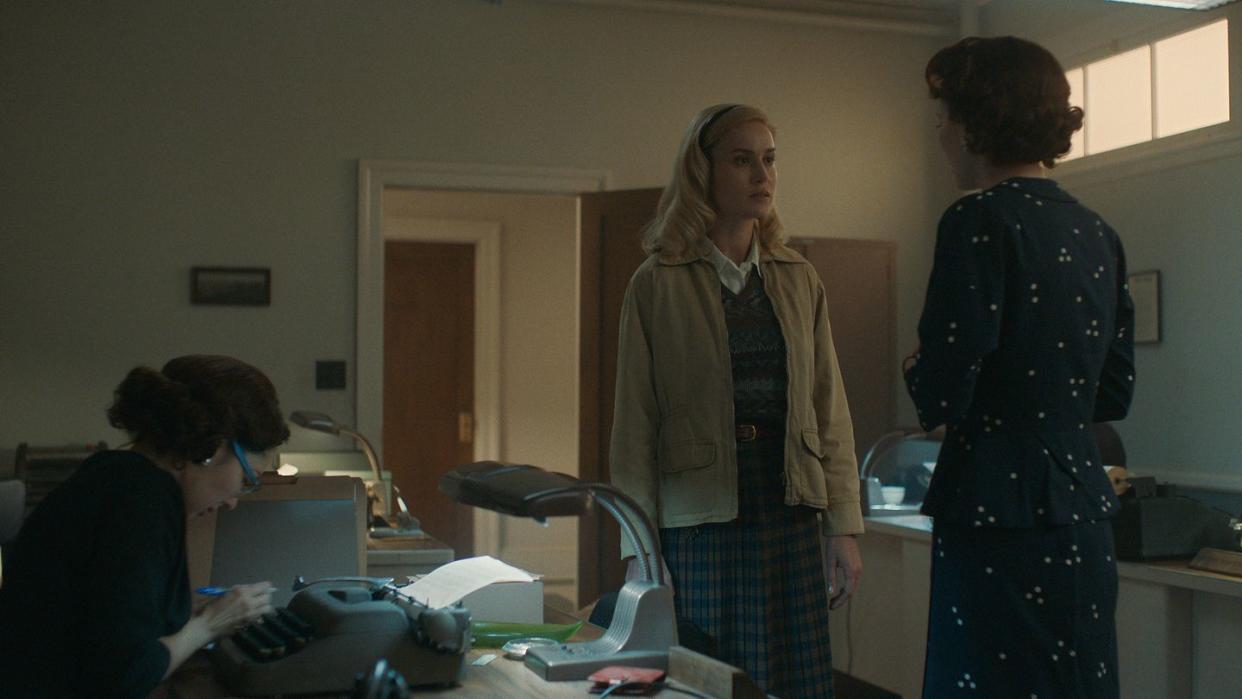
Elizabeth’s road to getting fired is equally sexist.
After Elizabeth has lost the love of her life and her research partner, Hastings packs up the lab she shared with Calvin because they see this work as belonging to the institute. Elizabeth has zero rights in this case: She isn’t Calvin’s spouse, nor is she a doctor. Instead, she must suck it up and take whatever work she can get while trying to bide her time to get her hands back on their research. However, when Elizabeth can no longer hide her “condition,” she is fired for being pregnant and unwed. She is equally defiant in her exit on the page and screen.
A new career beckons in a similar fashion.
When Mad is a baby, in an enterprising move, the series stays true to the book as Elizabeth charges the Hastings scientists whenever they need assistance with their work—which is a lot. She returns to her former workplace to confront Dr. Donatti about him stealing her work, which differs from her going back as a lab tech in the book before discovering this theft. Later, while some specifics don’t match the text, Elizabeth’s road to a TV career is also due to some stolen school lunches. Amanda (Shoo Shoo Parsells), one of Madeline’s (Alice Halsey) classmates, has been taking Madeline’s food, and when Elizabeth confronts Amanda’s father, Walter (Kevin Sussman), she scores the TV job in the process—even though she turns him down.
Some changes take place at Hastings.
Donatti is fired from Hastings much earlier in the TV series, which Elizabeth discovers when she asks for a recommendation for a job at another institute. While she is offered a position at Hastings, there are still strings attached, and Elizabeth won’t play second fiddle anymore. Elizabeth ultimately ends up saying yes to Walter’s TV offer to pay for Madeline’s private school education, an additional motivation invented by the show.
Walter and Elizabeth’s relationship remains strong.
Single-dad Walter and Elizabeth’s dynamic in the book is a highlight replicated here. In a playful sequence, Elizabeth studies ratings in theTV Guide and catchphrases. “Children, set the table. Your mother needs a moment to herself,” is what she lands on for her closer, and in the novel, this is inspired by Harriet. An encounter outside a grocery store with a frustrated mother is what inspires this decision in the TV adaptation. Initial teething problems are from the page (including a tight wardrobe), but there is much more rehearsal time, and Elizabeth gets to see the set before the first taping. Walter’s boss, Phil (Rainn Wilson), is as sexist and dismissive as his book counterpart (though more crass).
Elizabeth’s forthright opinions are beloved and loathed.
The audience Q&A portion with Elizabeth follows the book formula when the chemist encourages a housewife to pursue her dream of becoming a heart surgeon. However, Elizabeth does not make her atheist beliefs known on air, which leads to death threats. Instead, Elizabeth’s vocal position on the racism impacting her neighborhood causes consternation. In the sixth episode, Elizabeth refuses to endorse a sponsor’s product that she thinks is vile. Phil suspends her for three days and plays reruns instead. The rest of the crew loses pay for this time off, and she gets some pushback. Elizabeth swallows her pride and endorses the product to ensure this doesn't happen again. In the book, Phil punishes her for insulting a potential sponsor by calling her to his office alone, where he tries to assault Elizabeth sexually. When she pulls her chef’s knife on him, Phil has a heart attack. This plot has been cut from the show.
This story will be updated.
You Might Also Like
